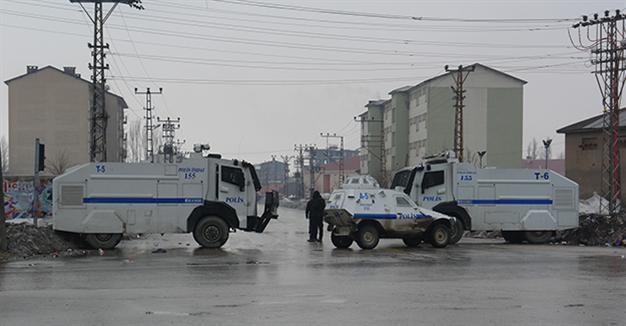Curfews declared in two southeastern Turkish towns before large operations
HAKKARİ / MARDİN

AA Photo
Turkish security forces have stepped up vehicle and personnel deliveries to the southeastern towns of Yüksekova and Nusaybin, after curfews in both were declared on March 13 ahead of large-scale operations against the outlawed Kurdistan Workers’ Party (PKK).
Around 100 mine-resistant armored vehicles arrived in the center of Yüksekova, in Hakkari province, after a curfew was declared earlier in the day with announcements from military vehicles and mosques in both Turkish and Kurdish.
The Şemdinli, Esendere, Dağlıca and Van entrances to the town have now been put under strict control by the security authorities.
The Hakkari governor said the state “would help all locals who would like to move elsewhere during the curfew.”
The governorate said the indefinite curfew would go into effect at 10:00 p.m. on March 13 in downtown Yüksekova, as entrances and exits to the town were banned. The division command post in Yüksekova dispatched helicopters to the hills surrounding the district.
Just hours before the start of the curfew, four people, including a reporter, were wounded in a blast in the town’s Orman neighborhood. The cause of the blast remained unclear.
In Mardin province’s Nusaybin, the curfew went to effect starting from midnight on March 13/14.
Civilians started leaving several Nusaybin neighborhoods, where ditches were dug and barricades were erected by PKK militants.
The Education Ministry sent a note to teachers working at public schools in Yüksekova as an apparent warning to make them leave the town, saying they could use their annual leave during the curfew period.
Meanwhile, operations in the restive Sur district in the center of the southeastern city of Diyarbakır restarted on March 13 after security forces identified PKK militants opening fire from several buildings.
Security forces reportedly killed eight militants in an operation that began after two police officers were wounded.
The clashes came after the Diyarbakır Governor’s Office announced that the curfews in the Cevatpaşa neighborhood and Gazi Street in Sur, along with several other streets, were lifted as of 8:00 a.m. on March 13.
In the capital Ankara on March 13, Turkish Chief of General Staff Gen. Hulusi Akar paid a visit to the Special Forces Commandership to join the 3rd Term Special Forces Specialization Training commencement ceremony. Special forces have been playing active roles in ongoing anti-PKK operations across the southeast.
Interior Minister Efkan Ala signaled the start of a wave of new operations on March 11 after the lifting of curfews in two other towns.
“Eight districts have been cleared. But there are still trenches and barricades in Yüksekova, downtown Şırnak and Nusaybin. The information we have gathered shows bombing traps placed there, so clearances will be conducted in those districts too,” Ala told reporters in Ankara on March 11.
“Overall, 279 members of the separatist terrorist organization have been killed in operations in Sur, 206 barricades have been removed, and 365 improvised explosive devices [IEDs] have been deactivated,” the General Staff said in a written statement on March 10.
Around 100 mine-resistant armored vehicles arrived in the center of Yüksekova, in Hakkari province, after a curfew was declared earlier in the day with announcements from military vehicles and mosques in both Turkish and Kurdish.
The Şemdinli, Esendere, Dağlıca and Van entrances to the town have now been put under strict control by the security authorities.
The Hakkari governor said the state “would help all locals who would like to move elsewhere during the curfew.”
The governorate said the indefinite curfew would go into effect at 10:00 p.m. on March 13 in downtown Yüksekova, as entrances and exits to the town were banned. The division command post in Yüksekova dispatched helicopters to the hills surrounding the district.
Just hours before the start of the curfew, four people, including a reporter, were wounded in a blast in the town’s Orman neighborhood. The cause of the blast remained unclear.
In Mardin province’s Nusaybin, the curfew went to effect starting from midnight on March 13/14.
Civilians started leaving several Nusaybin neighborhoods, where ditches were dug and barricades were erected by PKK militants.
The Education Ministry sent a note to teachers working at public schools in Yüksekova as an apparent warning to make them leave the town, saying they could use their annual leave during the curfew period.
Meanwhile, operations in the restive Sur district in the center of the southeastern city of Diyarbakır restarted on March 13 after security forces identified PKK militants opening fire from several buildings.
Security forces reportedly killed eight militants in an operation that began after two police officers were wounded.
The clashes came after the Diyarbakır Governor’s Office announced that the curfews in the Cevatpaşa neighborhood and Gazi Street in Sur, along with several other streets, were lifted as of 8:00 a.m. on March 13.
In the capital Ankara on March 13, Turkish Chief of General Staff Gen. Hulusi Akar paid a visit to the Special Forces Commandership to join the 3rd Term Special Forces Specialization Training commencement ceremony. Special forces have been playing active roles in ongoing anti-PKK operations across the southeast.
Interior Minister Efkan Ala signaled the start of a wave of new operations on March 11 after the lifting of curfews in two other towns.
“Eight districts have been cleared. But there are still trenches and barricades in Yüksekova, downtown Şırnak and Nusaybin. The information we have gathered shows bombing traps placed there, so clearances will be conducted in those districts too,” Ala told reporters in Ankara on March 11.
“Overall, 279 members of the separatist terrorist organization have been killed in operations in Sur, 206 barricades have been removed, and 365 improvised explosive devices [IEDs] have been deactivated,” the General Staff said in a written statement on March 10.
















